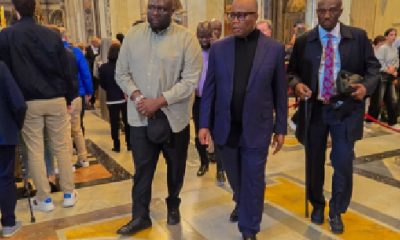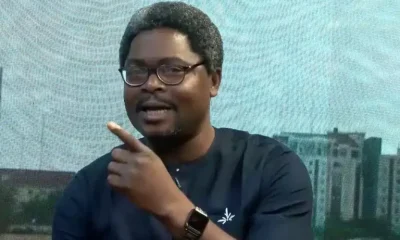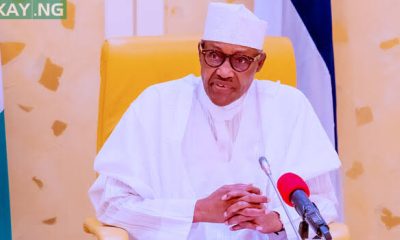Economy
We’ll fix economy, security , fight corruption — VP Shettima

Vice President Kashim Shettima has assured Nigerians of the commitment of the ruling All Progressives Congress, APC, administration to fight corruption, fix the economy, improve national cohesion and strengthen the independence of the judiciary.
Shettima gave this assurance at the national conference on strengthening democracy in Nigeria on Monday in Abuja.
The conference themed, ‘Strengthening Nigeria’s democracy: Pathways to good governance and political integrity’,was organised by the African Centre for Leadership, Strategy and Development.
Shettima, who was represented by his Special Adviser on political issues, Hakeem Baba-Ahmed, admitted that while democracy is not a perfect system, compared to others, it is the best form of government.
“We will listen and adjust where necessary, and we will account for our stewardship in all matters our challenging democratic systems demand.
“I am convinced that Nigeria shall rise again, answer to its full potential and lead the way to a future that has learnt lessons from a difficult past into a world in which our country will be a key player, and our young will be active champions of a democratic system because it speaks to them.
“It has been said many times that democracy is an imperfect system, yet superior to all others.
“We will continue to seek to provide evidence of the values of the democratic systems by, among others, fixing major weaknesses of our economy, securing our communities, fighting corruption, supporting free and fair elections, strengthening the independence of the judiciary and improving national cohesion,” he said.
Shettima urged Nigerians to support the current administration in this challenging but ultimately rewarding journey, dtressing that the Bola Tinubu administration has a major interest in the quality of the democratic system.
Economy
More Nigerians to experience poverty by 2027 – World Bank

The World Bank’s latest Africa’s Pulse report has projects a grim future for Nigeria, with poverty expected to rise by 3.6 percentage points by 2027.
Released during the IMF and World Bank Spring Meetings in Washington, DC, the report cites Nigeria’s reliance on oil, economic fragility, and governance challenges as key drivers.
It highlights the country’s structural economic weaknesses, dependence on oil revenues, and national fragility as key barriers to meaningful poverty reduction.
“Poverty in resource-rich, fragile countries, including large economies like Nigeria and the Democratic Republic of Congo, is projected to increase by 3.6 percentage points between 2022 and 2027,” the report stated.
Despite recent growth in Nigeria’s non-oil sector during the last quarter of 2024, the World Bank warns that this progress is unlikely to translate into widespread poverty alleviation due to ongoing fiscal and institutional challenges.
The report emphasizes that Sub-Saharan Africa remains the world’s poorest region, with an overwhelming 80% of the globe’s 695 million extreme poor residing there in 2024.
Within the region, half of the 560 million extremely poor people were located in just four countries, including Nigeria.
In stark contrast, South Asia accounted for 8% of the world’s extremely poor population, East Asia and the Pacific 2%, the Middle East and North Africa 5%, and Latin America and the Caribbean 3%.
The World Bank attributes the rising poverty in Nigeria and similar economies to weakening oil prices and fragile governance structures, noting: “This follows a well-established pattern whereby resource wealth combined with fragility or conflict is associated with the highest poverty rates, averaging 46% in 2024, which is 13 percentage points higher than in non-fragile, resource-rich countries.”
Meanwhile, non-resource-rich countries in Africa are experiencing stronger economic growth and faster poverty reduction, buoyed by high agricultural commodity prices and more resilient fiscal policies.
To reverse Nigeria’s downward poverty trend, the World Bank recommends reforms that prioritize inclusive economic growth and stronger public financial management.
It calls on the government to focus on “improving fiscal management and building a stronger fiscal contract with citizens to promote inclusive economic development and long-term poverty alleviation.”
Economy
SEE current exchange rate of the Dollar to Naira

What Is the Dollar to Naira Exchange Rate at the Black Market (Aboki FX)?
Here is the Dollar to Naira exchange rate at the parallel market, popularly known as the black market (Aboki fx), for Tuesday, April 23, 2025.
You can exchange your dollars for naira at the following rates:
Black Market Exchange Rate (Lagos – April 23, 2025):
According to sources at the Bureau De Change (BDC), the exchange rate at the Lagos parallel market saw traders buying at ₦1610 and selling at ₦1620 per US dollar.
It’s important to note that the Central Bank of Nigeria (CBN) does not recognize the black market. The CBN advises individuals seeking foreign exchange transactions to do so through their banks.
Dollar to Naira Exchange Rates
Market Type Buying Rate Selling Rate
Black Market ₦1610 ₦1620
CBN Official Rate ₦1591 (Low) ₦1606 (High)
Note: Forex rates vary across dealers and regions, and actual rates may differ from those listed.
Meanwhile, the Nigeria Customs Service (NCS) has announced the seizure of 298 smuggled items worth ₦7.6 billion between January and March 2025. The NCS also disclosed that it generated a total revenue of ₦1.75 trillion in the first quarter of the year.
Economy
Volvo announces termination of 800 U.S. workers, cites tariff, market decline

Volvo Group has announced plans to lay off up to 800 workers at three of its U.S. facilities over the next three months, citing ongoing market uncertainty and declining demand exacerbated by tariffs introduced under the administration of President Donald Trump.
The affected locations include the Mack Trucks plant in Macungie, Pennsylvania, as well as Volvo Group sites in Dublin, Virginia, and Hagerstown, Maryland.
In a statement on Friday, Volvo Group North America confirmed that between 550 and 800 employees would be impacted.
The company, a subsidiary of Sweden’s AB Volvo, employs nearly 20,000 people across North America.
The layoffs come amid wider turmoil in the automotive and manufacturing sectors, as shifting U.S. trade policy and a series of tariffs continue to drive up production costs. Economists have pointed to the uncertainty surrounding Trump’s trade strategy as a factor undermining both business and consumer confidence, with concerns mounting over a potential economic slowdown or recession.
According to Volvo, the company is grappling with a decline in heavy-duty truck orders, driven by instability in freight rates, anticipated regulatory changes, and the growing financial burden of tariffs. “We regret having to take this action, but we need to align production with reduced demand for our vehicles,” a company spokesperson stated in an email quoted by Reuters.
Volvo’s announcement marks another blow to an industry already navigating a complex web of supply chain challenges and fluctuating market conditions, with other manufacturers also warning of potential cost hikes and disruptions tied to global trade disputes.
-

 News20 hours ago
News20 hours agoAkpabio arrives Vatican ahead Pope’s funeral
-

 News14 hours ago
News14 hours agoList of World Leaders that are present in the final funeral of Pope Francis
-

 News10 hours ago
News10 hours agoJust in: Gunmen invade pro-Wike group in Bayelsa
-

 News18 hours ago
News18 hours agoDefections: Teejay Yusuf traces genesis of PDP palaver, key issues affecting Nigeria’s largest opposition party
-

 News19 hours ago
News19 hours agoCBEX: EFCC declares four persons wanted over crypto fraud + photos
-

 News14 hours ago
News14 hours ago2Face estranged wife, Annie Macauley breaks silence after he married Natasha
-

 News19 hours ago
News19 hours agoScandal! Osun monarch, pastor admit to COVID-19 fraud in US
-

 Politics17 hours ago
Politics17 hours agoUgochinyere remains Nigeria’s number one Hushpuppi of politics-Olayinka carpets Imo Rep
















